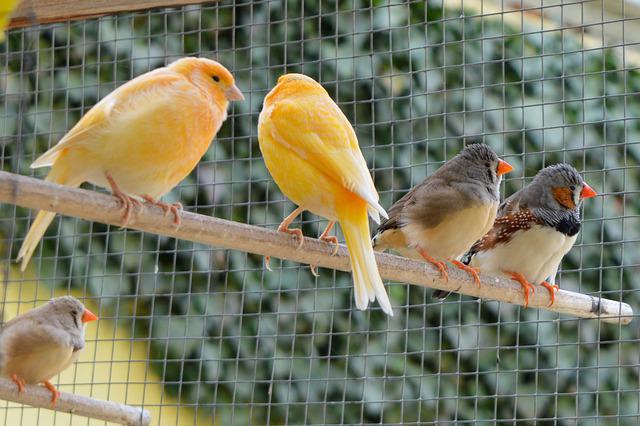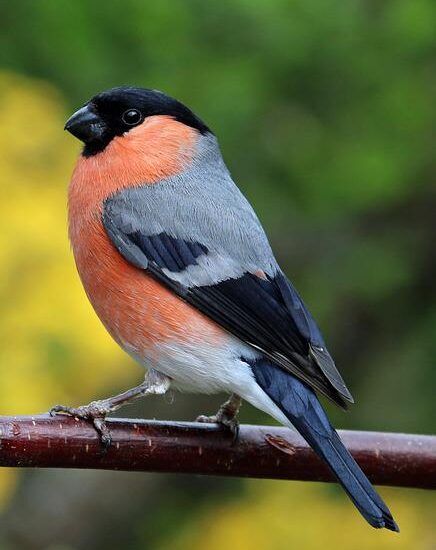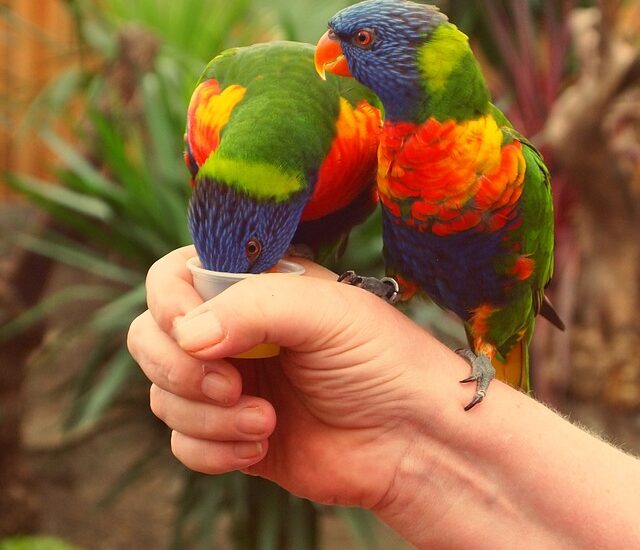How To Care for Finches: A Guide by Expert
Finches are small birds, with an average length of about 4-7 inches and a life span of 5-10 years, with different species having varying color plumage. They are an amazing sight to behold, adding aesthetic beauty to any place they are kept, flitting in a blur of vivid feathers, interacting with the other finches, and singing melodiously. Although they do not require the human company to stay happy, they do need fellow finches with them, as being social birds, they get depressed without their flock mates. The most common types of finch species kept as pets are zebra finches, society finches, and Gouldian finches.
Finches are ideal pets for people, who do not have time and energy for high-maintenance pets, like dogs and cats, or for those people who just like to observe their pets from far without interacting physically with them. Finches are low-maintenance pets that do not require a lot of attention from their pet parents; rather, they flourish well when left to their own device, providing that their few needs are met, like feeding regularly, the companionship of other finches, an adequate cage, and its subsequent cleaning is assured. In this article, we will discuss several things that are required to make sure that your finch is being cared for in the best possible way and is happy and healthy.

What Do Finches Eat?
Feeding your finches daily, a healthy and well-balanced diet is a significant part of taking care of them. Although they do not eat a lot, they do need to eat quite often to keep up with their fast metabolism, that is why they should always have food in their cage. Your finch’s diet should contain seeds, like hulled thistle (Nyjer), sunflower, millet, and flax seeds, as they contain fats, which are essential for the tiny birds.
Besides the seeds, finches also require nutrients from fresh fruits and vegetables, you can feed them beans, bananas, mango, green leaves, bell pepper, pumpkin, or any other readily available fresh item. You should chop any item you offer them into tiny pieces and then place it in a bowl in your finch’s cage but remember to remove any leftover food as it may become spoiled due to bacterial growth.
If your finch is suffering from diarrhea, its feces are watery, it might be because of excessive water intake in their diet because of fruits and vegetables, so, you should cut down their fresh fruit and veggies intake. You can also give your finches vitamin supplements, which are available as powders that can be mixed in their food, and millet sprays as a treat a few times a week to improve your bird’s overall health.
Finches that are laying eggs need more protein and calcium in their daily diet, that is why you should add boiled eggs, cheese, and worms like mealworms and waxworms, whether dead or alive, in their daily diet.
Your feathery pets also require water to be present at all times in their cage. Their water bowl should be washed daily and filled with clean water to prevent any bacterial or fungal growth. You can also include a birdbath in their enclosure as finches are a huge fan of birdbaths, especially during summers, when they bathe to cool their tiny bodies.

Housing And Accessories Needed for Finches
Since finches are flight birds, they require a large cage in which they can fly freely. Although an adequate height of their enclosure is important, the length and the width of their cage are more significant. When buying a cage for your finches, you should aim for a vertical enclosure that should ideally be about 30” in length, 10” wide, and have a height of 15”. The larger their enclosure is, the happier your birds will be, as they spend most of their time in the cage.
The bars of their cage should not be at a distance greater than 1cm apart, and their enclosure’s gate should always be kept close, as the birds can squeeze through tiny gaps and make a run for their freedom. You should place their cage about 5-6 feet above the ground where overly inquisitive pets, like cats and dogs, or children won’t disturb your finches’ peace. Their enclosure should not be kept outside or in any place where it is drafty or has a temperature above 80-degree Fahrenheit or below 60-degree Fahrenheit. They need sunlight during the day and complete darkness at night, which you can accomplish by covering their cage with a thick cloth when it is time to sleep.
Things you should include in their habitat are:
· Perches – are of vital importance in your bird’s enclosure, as gripping the perch helps exercise finches’ feet and prevent any sores from forming on their feet. The perches you keep in the cage should not be so thick that your bird can’t grip them or have a rough texture that damages the finch’s feet. The ideal perch would be a natural perch from trees like maple, cherry, or elm. You should place several different types of perches in their enclosure, having varying textures so that your bird can exercise its feet better.
· Toys – finches don’t need toys to chew on; rather, they enjoy things like bells, which they manipulate with their beaks to create sound, and mirrors placed in their cage. Some finches also like to chew on fabric or leather, which you can provide them, ensuring that they don’t fray and get stuck in their throat. You can also place tiny ladders or swings in their cage as the birds like hopping on them.
· Food and water bowls – should be cleaned regularly and their placement in the cage should be in such a manner that the bird’s dropping doesn’t contaminate it. The food and water bowls should not be placed under the perches or swings as in those places there will be a higher chance of droppings falling in them.
Several toy options are easily available at pet stores but since the finches have a short attention span you should not place all their toys in the cage at the same time, rather alternate between placing the toys you have so the finches don’t get bored of their toys.

Medical Needs and Common Health Problems
For your finches, you should find a vet who is also an avian expert, as finches need a yearly check-up as well as their nails trimmed every few weeks to a month by a professional to avoid injury. Unlike larger birds like peacocks, finches should not have their wings clipped as it is a high-risk procedure.
A healthy finch is active, eats multiple times a day, self-grooms, and socializes with its fellows, while an unhealthy finch will likely be lethargic, sitting by itself with its feathers fluffed up, not eating, or drinking and may be wheezing or have nasal discharge. If your finch is showing any of these signs, it’s time for a visit to the vet.
Some of the common medical conditions in finches are:
- Diarrhea – finch passes loose stool, it might be because of intestinal parasites, bacterial or viral infection, or simply because of a change in its diet. If diarrhea persists, you should visit the vet.
- Air-sac mite infection – caused by the mites which over time can cause complete blockage of the airway. Finches suffering from this infection have trouble breathing, they can be seen breathing with their beaks open, and are agitated. If you suspect your finch has a mite infection, you should get them urgent medical attention. To prevent any type of mite infection in the finches, their cage should be kept clean and dry.
- Bumblefoot – is an infection on the bottom of the feet of the finch, that causes inflammation, redness, and overall discomfort to your bird. It is caused primarily because of the sluggish bearing of the finch, and for its cure, you should add textured perches to the finch’s cage so it may exercise its feet.
- Overgrown beak – finches can suffer from an overgrown beak that makes it difficult for them to grab things and eat, you should not attempt to trim it by yourself as you may end up trimming it too short or hurting the finch, the best approach is to take it a vet who can safely trim the enlarged beak.

Choosing Companions for Your Finch
Finches are social animals; they need the company of other finches to be content in their cage. Before adding a new finch to your finch’s cage there are several things to consider, some species of finches are aggressive towards other species of finches so you need to consult an Avian expert before releasing more finches in the cage, similarly adding only one new finch can cause problems too, as the new finch might be treated as an outcast by the other finches and bullied, thus, finches should only be added in pairs.
If you are not prepared to take care of new finches, you should not house both the male and female finches together. Although, if you want your finches to procreate, you should add nesting material to their cage. You can also only keep same-sex finches, whether males or females, as they can live together peacefully, granted that they are from the same species as different species of finches can be aggressive towards each other.
Never house finches and other birds, like parrots or cockatoo, together as the bigger birds can injure the tiny finches or terrorize them causing them unwanted anxiety and destroying their peaceful lives. You should not crowd the finch’s enclosure either, by keeping too many finches in a small cage, as that can cause finches to be agitated.

Cleaning The Finch’s Cage
Cleaning the finch’s cage and all the stuff in it at least once a week is required to prevent the spread of any bacterial, fungal, or mite infection in the finches. For cleaning the cage, you need to first move the finches to another cage that can be a carrier cage as well, as the finches will be in it for just a short time while you clean. Before getting the finches out, remove any enrichment stuff, toys, food, and water bowls from the cage as the birds, flying about in panic when you try to catch them, may crash into them, injuring themselves. You should hold the finches gently as roughly handling them can severely injure them, you can also use a piece of cloth to capture them.
You should wash the cage and the toys thoroughly with mild detergent, ensuring that you remove all of the detergents off with lots of water as any residue left on the surface can be lethal for the bird’s health. Dry the enclosure completely before returning the finches back in it. The natural perches are an ideal spot for moisture to collect, which can promote the growth of bacteria, therefore you should also wash and disinfect them at least once a week.
An ideal finch’s cage is clean and dry. To achieve that, besides the weekly cleaning, you should remove any leftover food at the end of each day and wash their food and water bowls daily. The substrate at the bottom of their cage should also be changed once a week, if you don’t have any substrate available you can also use old newspaper or paper towels in the substrate’s place to easily clean the bird’s mess.
The perches should be placed in such a manner that sitting on it the finch’s tail doesn’t dip in the water bowl or the food and water bowl are not placed directly under it so the droppings do not fall in them and contaminate them.



